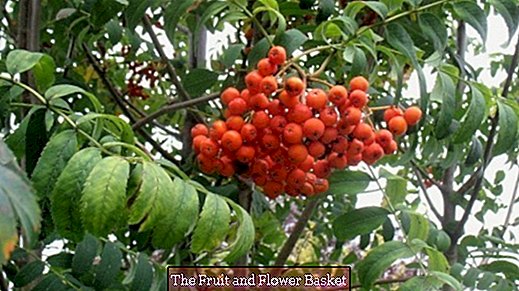Rowan berries - not only for birds!
For a very long time the rowan berries (Sorbus aucuparia) were considered poisonous. It is inexplicable where this widespread assumption comes from, because one can hardly confuse it with other, poisonous berries. I've just learned that this is not the case - rowan berries are non-toxic and even edible.
Although the raw berries are quite bitter and therefore you can not and should not consume them in large quantities. But when boiled and jam, jelly or mush with apples or pears, they develop a bitter-sweet aroma. Also for the preparation of liquor or liqueur, they can be used.
The rowanberry
The rowan (also known as mountain ash) comes from the rose family. A mountain ash can become over 100 years old in good conditions. It is one of the smaller shrubs and rarely reaches a height of more than 15 meters. Rowan berries have their name because birds like to eat the berries. But also for other species such. Squirrel, badger, fox, field mouse and deer are the mountain ash an important food source.
The rowanberry is widespread almost throughout Europe and grows due to its low demands on the soil quality in coniferous and deciduous forests, at forest edges, also on roads and paths and even on fallow land or in the mountains as well as often as a hedge plant.
The rowan berries
The rowanberries ripen in autumn until October. The best harvest time is after the first frost, because the fruit only then develop their sweet-tart aroma properly. However, you have to forestall the birds, because if you wait too long, you can be unlucky - and the birds have already harvested the tree.
Rowan berries not only contain abundant vitamin C needed by the body to build up bone and connective tissue, but also provitamin A, which is converted into vitamin A in the body, which is important for vision.
In addition, the berries contain but also parasorbic acid, which tastes bitter and slightly toxic.
Therefore, they should not be eaten raw, because the consumption of larger amounts can cause stomach discomfort, vomiting and diarrhea. But if you cook them, the bitter Parasorbinsäure is converted into sorbic acid, which has only a weak sour taste and the body tolerates well. Sorbic acid is z. B. also used for food preservation, but only in a very low concentration, which is barely perceptible.
But there are also rowanberry varieties that can be eaten raw, eg. B. the bitter-poor variety? Edulis? or the bittern-free strain? rosina ?.
Ingredients of rowan berries
In addition to vitamin C, provitamin A and parasorbic acid, rowan berries also contain malic acid, citric acid, essential oils, bitter substances, carotenoids, tannins, magnesium and pectin.
Healing effects
- Due to the numerous ingredients, rowan berries have an appetizing, invigorating and blood-purifying effect and can help with gastrointestinal complaints, metabolic disorders, liver weakness, lung diseases, prostate problems, vitamin C deficiency, loss of appetite and sore throat.
- Through their tannins and bitter substances, rowan berries can digestive system effectively support both diarrhea and constipation as well as problems of biliary help.
- The provitamin A acts as Antioxidant (radical scavenger).
- Dried rowanberries are said to be kidney function stimulate and promote the excretion of kidney stones.
- Also at Vitamin C deficiency can help rowan berries, that's why they were opposed earlier scurvy used.
- Freshly squeezed rowanberry juice with a little honey is helpful against bronchitis and other pulmonary diseases and is even said to lung infection help.
- A rowan-mus promotes the structure of the intestinal flora bowel disease or a treatment with antibiotics.
- at Metabolic disorders, prostate problems, tonsillitis, sore throat and hoarseness on the other hand helps a tea of fresh rowan berries. This should also work against the green star, but this has not been proven.
- In spring, a tea can be prepared from the flowers and leaves of the mountain ash, which is added stomach discomfort helps and to Cleaning the bladder, kidneys and blood should contribute.
- But you can also use dried flowers and leaves for a tea infusion against Cough, bronchitis, as well as stomach problems use.
Tips for preparing jam, jelly or mus and tea
- For this purpose, the rowan berries must be cooked unconditionally, so that the bitter parasorbic acid is converted into the compatible sorbic acid. The berries are good for making Jam, jelly or mus. The jam or a chutney from rowan berries go well with game dishes, but also together with goat cheese they taste excellent.
- For a Rowan berry puree Soak the washed berries in vinegar water overnight. Then they are poured off and rinsed with cold water, then cooked softly with a little water and through the? Fleet Lotte? or a sieve happens. You can also mix the berries with apples or pears and season with a little cinnamon and cardamom. The mus can then be bottled in glasses.
- a Rowan berry tea You can make from 1 tbsp fresh rowan berries, pour over 200 ml of boiling water and leave to infuse for at least 10 minutes.
- In spring, take 1 tbsp of flowers and leaves of mountain ash, pour over 250 ml of boiling water and strain after 6 to 10 minutes.
- For a tea infusion with dried flowers and leaves you also take 1 tbsp and pour 250 ml of boiling water over it.
- Furthermore, the slightly sour, almond-like blossoms the rowan also be used well for seasoning desserts.
Application in the garden
As the leaves of the mountain ash are rich in magnesium, they are very well suited as a mulch for the improvement of poor garden soil.





